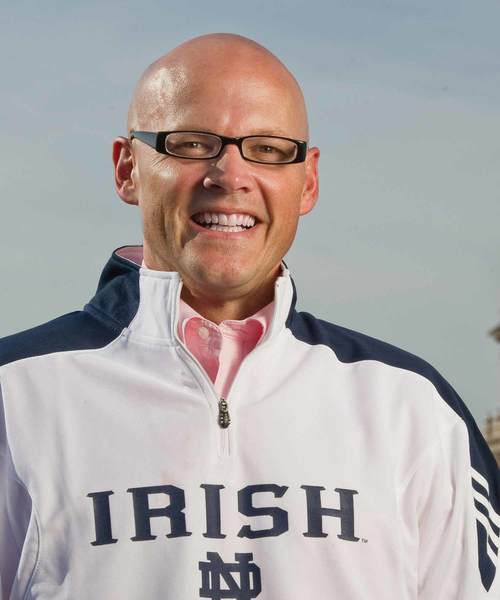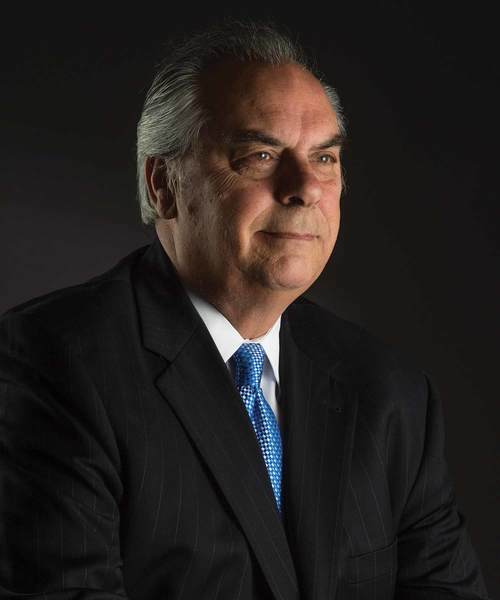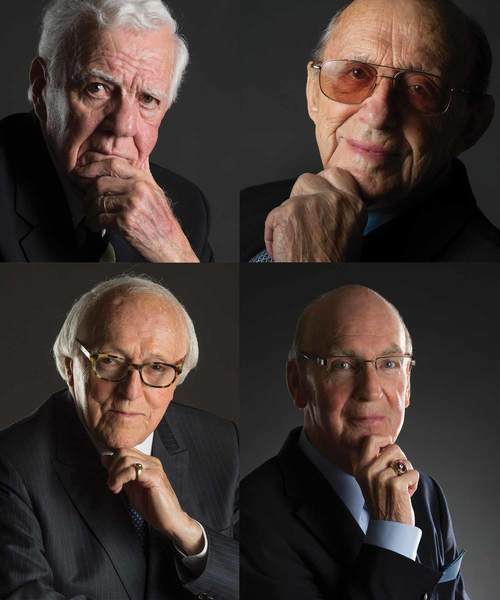
Greg Crawford
Taking community service on the road
Greg Crawford’s right wrist flaunts a cornucopia of color—bright charms from a summer full of heartrending memories.
Four stretchy bracelets—one red, one green, one lavender, one darker purple—represent some of the individuals he met last summer while Crawford and his wife, Renate, biked their way from Boston to Dallas from June 13–July 11.
Their self-described “Road to Discovery” benefitted the Ara Parseghian Medical Research Foundation and its fight to stamp out Niemann-Pick Type C (NPC) disease.
The red bracelet says: “I Believe … www.raceforadam.org” and represents an NPC-afflicted family living outside Philadelphia.
The green one says: “Dillon’s Army” and “Dillon’s Fight for a Cure” at www.dillonsfight.org, representing a Bethesda, Md., family.
The lavender one represents the National Niemann-Pick Disease Foundation.
The purple one says: “A Goal for Life” and www.parseghian.org, representing the Ara Parseghian Medical Research Foundation.
They are daily remembrances of the Crawfords’ month-long, 2,200-mile cycling adventure that brought them up close and personal with patients afflicted with Niemann-Pick Type C, a rare and deadly neurodegenerative disease that primarily strikes children before or during adolescence.
It’s the disease that has taken the lives of three of the four children of Mike and Cindy Parseghian—three of the grandchildren of Hall of Fame former Notre Dame football coach Ara Parseghian. Fittingly, the 2011 trip began in Boston where Ara Parseghian, grandson of the former Irish coach and lone surviving child of Mike and Cindy, attends medical school at Tufts.
“I’m afraid to take them off because I think the bracelets brought us good luck on our ride,” says Crawford as he thinks back to their summer in the sun.
Crawford’s connection to Notre Dame, and to the Parseghians, and to Niemann-Pick Type C did not develop by accident.
Dean of the University of Notre Dame College of Science, Crawford grew up just outside of Cleveland, in Elyria, Ohio.
“I started at Notre Dame in 2008 and Cindy (Parseghian) was on my science advisory council. I knew the story very, very well from when I was at Brown (1996–2008, first as an assistant professor of engineering and eventually as dean of engineering),” he says.
“My great-uncle (Jim “Pomp” Harris, later a line coach at both Holy Cross and Iowa under Notre Dame alumnus Dr. Eddie Anderson) played for Knute Rockne. So my dad grew up with him. When we were growing up we would come over for games here, and I was a big Notre Dame football fan. We would come to the Blue-Gold game almost every year. One Blue-Gold game when I was seven or eight we came down on the field after the game and I met Coach Parseghian. It’s kind of amazing how we ended up being involved in this 35 years later.
“Even before I came to Notre Dame, when I was still at Brown, I went out to Tucson for the Niemann-Pick conference and met Cindy and Mike.
“The story is just incredible—and we should be the ones at Notre Dame to solve this. We should be the ones out there raising the money and trying to make it happen.”
So it was no coincidence Notre Dame made the decision to expand its relationship with the Parseghian Research Foundation in the summer of 2010.
An inherited cholesterol metabolism disorder that strikes one in every 150,000 children, NPC has been referred to by the National Institutes of Health as “childhood Alzheimer’s” because of similarities in the brains of NPC and Alzheimer’s disease patients. NPC research has implications for Alzheimer’s, as well as a multitude of other conditions, including heart disease, stroke and Tay-Sachs disease.
Through a generous gift to Notre Dame, the Parseghian Foundation has established the Michael, Marcia and Christa Parseghian Endowment for Excellence to support NPC research and discovery and to build on the foundation’s commitment to collaborate with young researchers at other institutions. Funds have been dedicated in support of an annual NPC scientific conference held at Notre Dame beginning in 2011, bringing together researchers from around the world to share discoveries and progress.
The partnership strengthened ongoing NPC research efforts at Notre Dame, which include the multidisciplinary, collaborative Drug Discovery Core, established by Notre Dame faculty, to which any member of the NPC research community may turn for the design and synthesis of potential drug candidates; an undergraduate course offered through the University’s Center for Rare and Neglected Diseases in which students are trained in the collection and assessment of data from NPC patients, with the data then used to enhance treatment protocols; and a collaborative agreement between the University and Eli Lilly & Co. in the area of compound library screenings that aims to identify new hits for development as therapeutic agents.
“Our researchers are committed to fighting a multitude of diseases, including those that do not typically receive significant attention from the medical and pharmaceutical communities,” says Crawford. “As a Catholic research university, it is entirely within Notre Dame’s mission to take a lead role in the fight against the conditions that cause human suffering and to work toward therapies, treatments and cures. Niemann-Pick Type C is just one example of the need for research that bridges the gap between these diseases and the discoveries that will bring relief to the people who suffer from them.”
“By solidifying their partnership, the Parseghian Foundation and Notre Dame are creating a formidable weapon in the fight against Niemann-Pick Type C,” said Norbert L. Wiech, a 1960 and 1963 Notre Dame alumnus whose biotech company, Chromatin Therapeutics, has partnered with the University to conduct research on inherited genetic disorders. “By harnessing the energy and resources of the two entities, they are poised to make the breakthroughs that are necessary in order to make progress toward managing this devastating illness and others for which cures and treatments remain elusive.”
Cindy and Mike Parseghian are 1977 Notre Dame graduates. Cindy was honored in 2009 with a Notre Dame honorary doctoral degree for her dedication to advancing NPC research.
Founded in 1994 by Parseghian family members shortly after three of the Parseghians’ four children were diagnosed with NPC, the Parseghian Foundation is a grassroots, nonprofit organization dedicated to funding medical research projects to find a treatment for NPC and related neurodegenerative disorders.
A month after the announcement of the expanded partnership, the Crawfords embarked on the first of their two marathon bike rides—a 2,300-mile jaunt from Tucson (home of the Parseghian Medical Foundation) to the Notre Dame campus, from July 24 to Aug. 23, 2010. Their “Desert to Dome” trek was designed to bring awareness to the fight against NPC and help raise funds—with 15 Notre Dame alumni clubs along the way playing host to welcome events for the Crawfords.
“The first one was all about creating more awareness for what this fight is all about. There’s not all that much between Tucson and South Bend where we were riding, so the clubs were phenomenal,” Crawford says.
Last summer, the Crawfords decided to do it again. This time, their journey was designed to be more personal, as their nightly stops often featured meetings with children and families fighting NPC. They stopped at the University of Pennsylvania and the University of Texas, Southwestern, to meet with researchers seeking answers to the NPC challenge.
“Then you’d have the bathroom stops at the gas stations, with people constantly asking, ‘What are you doing?’ So it was a fabulous opportunity to tell the story to everyone we came in contact with,” says Crawford.
“We met with the families and heard their stories, so it was incredibly personal. We’re doing a documentary on all this, so we had very open conversations about what dealing with NPC is all about. We also stopped at the NIH (National Institutes of Health), which has a study going on, including one doctor with 64 patients, the most of anyone in the world.
“We knew the science portion of the disease. But it’s hard to really know the human side, the compassionate side of it. We saw families like the Parseghians with two or three children with Niemann-Pick.
“The strength of these families is phenomenal. I don’t know how they do it. I really don’t know how they do it.”
Crawford isn’t sure about the prospect of another bike ride. For now, on the 2012 docket (June 22–24) is a fundraising event at Pebble Beach Resorts in California, featuring three nights at the Lodge at Pebble Beach, welcome and closing dinners and receptions, plus golf at both the Spanish Bay and Pebble Beach courses.
In the meantime, the bracelets on Crawford’s wrist provide constant reminders of the intensely personal nature of the dozens of individual battles going on to fight NPC.
For Crawford, each color serves as a reminder of the work to be done to save another life.

